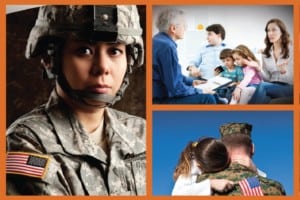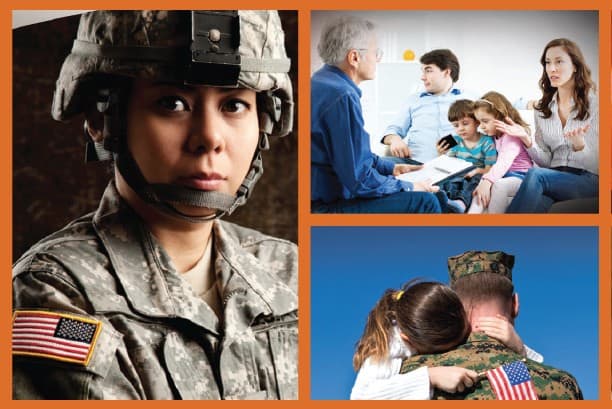The School of Social Work at The University of Texas at Austin will host the Third Annual Military Social Work Conference on September 16-18, 2015. This conference brings the latest research and most effective practices to social workers who provide mental health services to military men, women, and their families. It’s one of the few national conferences that bridges the gap between research and practice within the field of military social work.
Elisa Borah, co-chair of the conference and a research associate for the School of Social Work’s Texas Institute for Excellence in Mental Health, spoke with us about the conference as a valuable opportunity for practitioners.
 Tell us a bit about the conference. What is it and how did it come about?
Tell us a bit about the conference. What is it and how did it come about?
The first meeting took place in 2013, and it was organized by Drs. Allen Rubin, Eugenia Weiss, and Jose Coll, the editors of Handbook of Military Social Work. This first meeting had a dual focus on preparing practitioners as well as faculty in higher education –the idea was that faculty could use the information from the conference to better prepare future social workers to work with military populations. By military populations I mean active duty service members, reserve, and guard members in all U.S. military branches, as well as veteran service members and their family members.
Each year after that first meeting we have kept this dual focus. In addition to bringing the latest evidence-based practices to community-based social workers, we highlight educational initiatives that prepare students in military social work and initiatives that develop and support campus-based student veteran programs. At UT Austin, for example, Jeff Moe, an alum of the School of Social Work, runs an outreach program from veterans on campus that focuses on integration and academic retention and success. These types of programs are popping up around the country.
What is military social work?
Military social work is a field of practice based on understanding the most prevalent concerns that service members, veterans and their families face –such as the most common injuries of war, psychological and physical issues from injuries—and on offering effective treatments and referrals for these concerns. Practicing in this area requires specialized training, including the understanding of clients’ military experiences and how they influence assessment and treatment options. A big piece of military social work is for civilians to understand the uniqueness of military culture and all the values and core principles associated with it, which influence how the service member and their families experience the world.
How will this conference train participants to work with the military and veteran populations?
We have an array of clinicians and researchers coming to talk about their fields of expertise. This year we made sure that speakers offer very strong practice-based components. They aren’t just talking about studies. They will be offering practice-based presentations that will give participants who don’t have a lot of knowledge of military populations an introduction to skills that they can hone later, as well as give a refresher to practitioners who are already working with military clients.
We also made sure that the conference addresses a variety of clinical issues that are important: homelessness, domestic violence, military sexual trauma, post-traumatic stress, couples and marital counseling, and how to meet the needs of military children and families. In particular, we wanted to make sure that community practitioners understand the needs of veterans and their families. We believe family members of veterans are greatly underserved and often feel that they aren’t being served effectively, or at all. They feel ignored because there are not many community-based programs that specifically focus on veteran spouses and children.
What are evidence-based treatments and how do social workers use them?
They are treatments that have high-quality research evidence behind them indicating that they are effective with their target populations. Social workers use them with their clients in order to offer the most current, research-informed practices. It’s not always possible, though, as there’s not always research in the field you practice to inform what you do. But it’s the responsibility of a social worker to be up-to-date on the most current research and practices in their specific practice area.
Why is it important for social workers to develop culturally specific practices and what does that mean for this particular population?
Military service members and their families are a unique client population. They have served for years in military settings and conformed to a way of life, to a culture, that is different from that of the civilian world. Aspects of this culture include things like language. To be competent as a practitioner, you have to understand what they’re talking about, such as acronyms and other vocabulary that is unfamiliar to civilians. One reason this is important is because most active duty service members might not think that practitioners are able to understand them, to understand where they’ve been and what they’re going through. Often they don’t trust the practitioners if they haven’t been in the military. So the practitioner has to make the effort to become informed about military culture. That’s why it’s called cultural-competence: you have to meet your clients where they’re coming from.
What kinds of workshops will the conference offer?
We have two great pre-conference workshops. Dr. Craig Bryan, an expert in military suicide, will provide an 8-hour training in suicide prevention. His training will give clinicians a very strong foundation in an evidence-based approach to preventing suicide. They should be able to take these skills and start using them right away.
The other workshop will be an exciting panel on military culture by five military service members from each of the military branches. They will share basic knowledge around military cultural competence with their own perspectives from each branch.
We’re also having a resource fair and an evening poster reception (see poster presentations, PDF). It’s important for community-based practitioners to understand what resources are available for their clients.
What conference activities do you recommend for social work students?
If they attend the pre-conference workshop, they’ll definitely have a set of skills to deal with suicide prevention. Attending the talks on military culture will also be invaluable if they are hoping to work with the military after graduation—this will start to develop their knowledge and understanding regarding military members’ problems and concerns as well as solutions. They’ll be a lot more prepared to serve the needs of military service members, veterans and their families. In general, I think attending the conference will make them aware of resources for additional information where they can seek more in depth training to become more prepared for practice after graduation.
Where do we go from here in the context of military social work? What needs to be done?
I think there is a good deal of momentum within the field of social work to expand the work we do with military populations, and to ensure we are preparing students for the task. I think there will be an explosion across the country in the field of military social work as national, state and local programs start up to provide direct programming and in higher education.
I think the School of Social Work at The University of Texas at Austin is poised to be a leader in this area. Texas has the second largest veteran population in the country and our school can prepare students to meet their needs. The conference is part of this effort, and we hope to continue each year. We’re currently submitting a grant for funding to host a conference that specifically focuses on research with military children and families. It will have a much stronger translational research focus, which is all about bridging the gap between research and practice so that scientific findings can be implemented into practice and practitioners can inform the research that is done.
***
To register for the conference, visit the online registration site on or before August 14 to take advantage of the early bird discount. Questions can be directed to Liz Nowicki at lnowicki@austin.utexas.edu or call 512-471-2886.
Additional resources on military social work are available on the websites of the National Association of Social Workers and Council on Social Work Education. See also Strength of a Warrior, PTSD United, and U.S. Department of Veteran Affairs, or call the Veteran Crisis Line 1-800-273-8255, press 1.
Posted August 4, 2015. By Paepin Goff.


